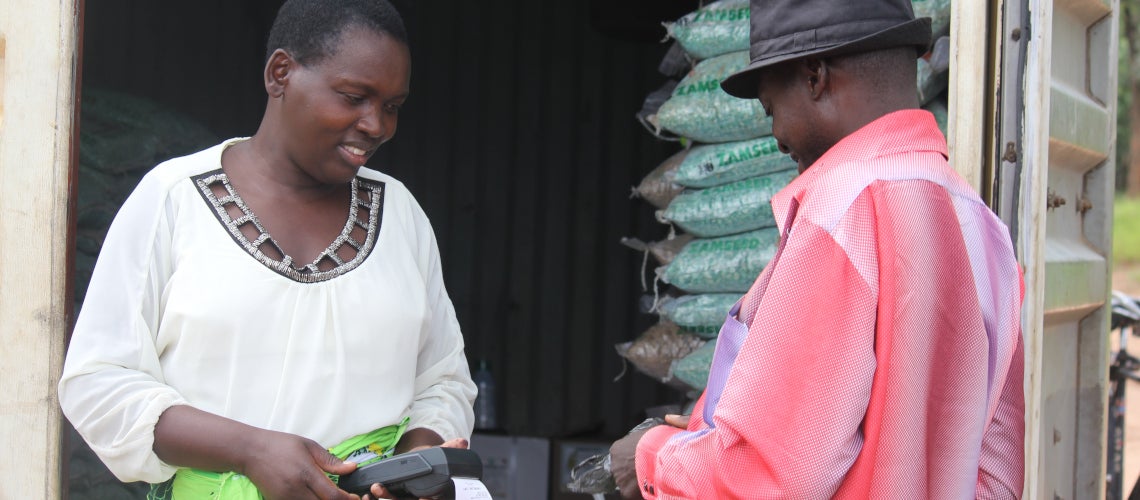 Digitized economic transformation in Zambia
Digitized economic transformation in Zambia
Inclusion. Productivity. Resilience. These are big words that at times can appear abstract - and what do they really mean in the context on digital technology?
Imagine, it’s 5am - just in time for Lubasi, a Zambian farmer, to take her big ripened tomatoes to one of Lusaka’s busiest markets, Soweto. Lubasi can’t afford her own ‘canter’ (‘truck’). But she has a cellphone, where she has downloaded an app that helps her quickly locate a trucker that has available space and is delivering to Soweto market. The trucker arrives, she loads in her boxes of fresh red tomatoes, and the trucker makes his way to town. Arriving at the bustling market, the driver easily locates Tembo, a marketeer who owns a produce stall. Tembo carefully picks his boxes and uses his cell phone to transfer the agreed price to Lubasi using mobile money. Once Lubasi receives the transfer from Tembo, she then transfers the payment for the trucking service to the trucker’s mobile wallet. Inclusion.
Lubasi’s brother is a trucker crossing the border from Zimbabwe with a 40 ft container full of construction materials for the new city hospital. His employer has filed all the border paperwork in advance, and Justice’s brother has a confirmation number. When the trucker arrives, the customs officer quickly locates his records in the integrated border management system, notices that the company has a good track record of compliance, reads off the weight of the truck on the display visible from the driver’s seat, asks Justice’s brother to pay the duties owed using his phone, and the permits are transferred to the his phone as proof of payment and compliance. Productivity.
Lubasi’s sister is going through difficult times. She lost her husband and is managing a small farm and a family of five on her own. She has qualified for government subsidies for her farm. The planting season is starting next month and she has just received the subsidy funding on her mobile phone. Tomorrow, she will purchase seeds and fertilizer to ensure her plot can be planted on time to feed the family and generate a small surplus to sell. Resilience.
These scenarios could easily become a reality for Zambia’s traders – small or large. The foundations are there – Zambia’s mobile network has been expanded, interoperability of payment modalities have been effected, and government has initiated simplifications at the border that could lead to tremendous efficiency gains once completed for both government and business.
The World Bank’s Digital Economy for Africa Initiative (DE4A) aims to ensure that every African individual, business and government is digitally enabled by 2030. A multi-disciplinary World Bank team, working in close collaboration with Cabinet Office, seven line ministries and 100+ representatives from the public and private sector carried out a Digital Economy Diagnostic of Zambia to identify what the country can do to accelerate economic transformation through use of digital tools.
The arrival of COVID-19 (coronavirus) has perhaps put more urgency behind the call for more rapid digitization in Zambia. Digitization of vital government and financial services in particular can reduce the impact of the pandemic on individuals, businesses and government. As we have seen in countries such as Kenya, Chile and others, digitized government-to-person systems have enabled the government to quickly get support to the most vulnerable populations.
The use of digital tools to accelerate progress towards increased inclusion, productivity and resilience requires:
- Accessible, affordable and reliable network access;
- Adequate digital skills;
- Optimized and secure digital government systems;
- Safe and widely available transaction platforms; and
- An environment that encourages the development of entrepreneurial solutions.
Underlying it all is a strong call for continuous public-private partnerships and dialogue. Through partnerships and dialogue, cost-effective solutions can be found and innovation balanced with risk mitigation.
Zambia has made progress in each of these areas; time is now ripe to optimize, scale and secure such that the full benefits of digitization can be achieved.
Will digitization solve all inclusion, productivity and resilience challenges in Zambia? No. But digitization can amplify and accelerate implementation efficiency and effectiveness. It is a tool in the economic transformation toolbox.


Join the Conversation